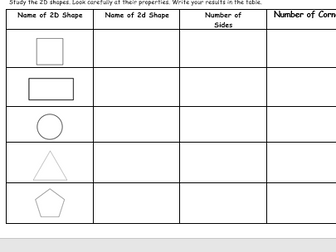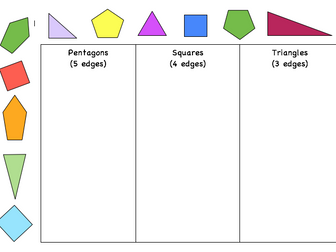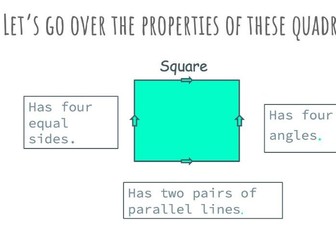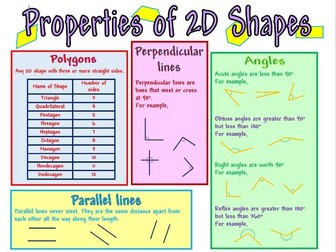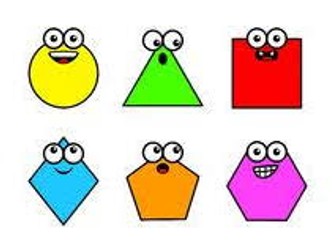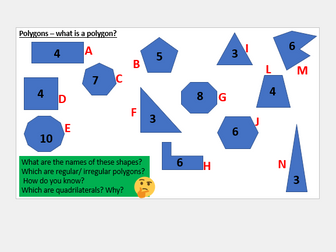
2D Shapes and their Properties Powerpoint
This powerpoint covers all common 2D shapes, properties and related vocabulary.
This is a useful tool to use when revising 2D shapes and introducing the correct terminology to use when describing/identifying shapes.
This can also be used to introduce further 2D shapes following pupils previous learning in past years.

Properties of 2D shapes
2 activities to use the vocabulary of properties of 2D shapes, may be useful as a class starter or plenary - or as a paired activity. Revision for KS2 SATs.

2d shape properties
Differentiated worksheet - colour properties of shapes and identify basic properties in a chart format. Up to octagon
undefined

Properties of 2D Shapes - Matching Activity
A great resource that I have used with most classes every year. It really gets the discussions going about the difference between shapes. It also make for a challenging competition / race.
A basic activity that matches 2D Shape names, diagrams and descriptions. Ideal printed, cut and laminated so that you can use again and again as a nice kinaesthetic activity. Can also be printed / displayed for students to write down the letters of the matching items.
Solutions included.

Sorting 2D Shapes
Sorting 2D shapes on Caroll diagrams.
Best suited for year 1,2
3 differentiated ability sheets.

2D shapes
This lesson is one I taught to my year 6 class. The teaching covers a range of properties of 2D shapes. Regular or irregular, parallel and perpendicular lines, types of angles (reflex, acute, right angle or obtuse), names of shapes.
The lesson finishes with the class filling out a table identifying features of 2D shapes mentioned in the main teaching. These are differentiated for LA, MA and HA.

Properties of 2D Shapes
This powerpoint is split into two lessons.
Lesson 1 - focuses on the properties of quadrilaterals.
Lesson 2 - focuses on regular and irregular pentagons and hexagons

Properties of 2D shapes
This resource is extremely informative. It includes the names of polygons in a table format, as well as defining and giving examples of perpendicular and parallel lines. The different angle types are given, also with visual examples.
On the second page, lines of symmetry and rotational symmetry are defined, again with examples.
This resource successfully supports children, allowing them to be independent learners. This resource would be useful within lessons where shapes are compared such as with the use of Carroll and Venn diagrams.
This is a two-page Microsoft Word document.

2D Shapes
This is a great SMART notebook for teaching the properties of 2D shapes (KS1)
This is a week long series of lessons suitable for a Year One or Two class

2D shapes Year 6
Day 1 : revises names of shapes, regular and irregular shapes, parallel and perpendicular lines, conventional markings for parallel sides and equal angles and types of angles. The worksheet is differentiated 3 ways for LA, MA and HA.
Day 2: properties of equilateral, right angle, isosceles and scalene triangles. The worksheet is differentiated 3 ways for LA, MA and HA.

2D Shapes and their Properties
To identify 2D shapes and their properties. To recall name of shape, number of sides it has and number of vertices (corners) it has. Reception class

2D shape posters with properties
I've been searching everywhere for a set of regular 2D shapes with their properties also listed. I couldn't find them anywhere so have created some simple posters. I thought someone else might find these useful!

Properties of 2D shape cards
Properties of 2D shapes including: number of sides, number of vertices and lines of symmetry. Activity allows children to match the description of the properties to the name of the shape to the picture of the shape. Can be used as a simple matching activity, a memory game (where all the cards are turned upside down) or a revision activity. Simply cut out the cards to start.

Properties: 2D: Shapes
2D Shapes Matching Activity
Differentiated matching activity - 18 2D. shapes to match.
Suitable for match up, memory game or articulate.
3 tiers of difficulty:
RED: circle, square, rectangle, 4 types of triangles.
AMBER: pentagon, hexagon, parallelogram, trapezium, rhombus, kite.
GREEN: sector, heptagon, octagon, nonagon.

2D Shapes & Their Properties
3 resources!
RESOURCE 1: A simple table to record:
Name of 2D shape
Number of sides
Number of corners
Pairs of parallel sides
.
RESOURCE 2: A 2D worksheet:
Draw and label a selection of 2D shapes
Write down the number of corners and sides each shape has
.
RESOURCE 3: Squared paper:
Ideal for drawing shapes
A4 size
.
All resources are fully editable

2D Shapes - Properties
Differentiated worksheets used with children in year 1 to develop understanding of properties of 2D shapes. Focuses on sides, corners etc.

2D shapes properties
Challenge 1- read the properties and write down what shape has been described using the word bank to support (triangle, square, rectangle and circle).
Challenge 2- read the properties and match this to the correct shape (triangle, square, rectangle, circle, hexagon, pentagon and semi-circle).
Reasoning and problem solving activity has also been included.


